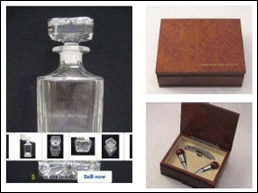Irwin IP LLC is pleased to announce that 3 lawyers have been included in the 2023 Edition of Best Lawyers: Ones to Watch.
Best Lawyers: Ones to Watch recognizes associates and other lawyers who are earlier in their careers for their outstanding professional excellence in private practice in the United States.
“Best Lawyers was founded in 1981 with the purpose of recognizing extraordinary lawyers in private practice through an exhaustive peer-review process. Nearly 40 years later, we are proud to expand our scope, while maintaining the same methodology, to recognize a different demographic of talented and deserving lawyers in Best Lawyers: Ones to Watch,” says Phil Greer, CEO of Best Lawyers.
Lawyers recognized in Best Lawyers: Ones to Watch are divided by geographic region and practice areas. They are reviewed by their peers on the basis of professional expertise and undergo an authentication process to make sure they are in current practice and in good standing.
Irwin IP LLC would like to congratulate the following lawyers recognized in the 2023 Edition of Best Lawyers: Ones to Watch:
- Victoria Hanson – Intellectual Property Law and Litigation – Intellectual Property
- Carey J. Prill – Intellectual Property Law
- Daniel Sokoloff – Intellectual Property Law

Irwin IP LLC attorney Barry F. Irwin was recently recognized by Best Lawyers® as the 2023 “Lawyer of the Year” both for Copyright Law and for Litigation – Patent.
Only a single lawyer in each practice area and designated metropolitan area is honored as the “Lawyer of the Year,” making this accolade particularly significant. These lawyers are selected based on particularly impressive voting averages received during the peer review assessments.
Receiving this designation reflects the high level of respect a lawyer has earned among other leading lawyers in the same communities and the same practice areas for their abilities, their professionalism, and their integrity.
In addition to the “Lawyer of the Year” award, Barry F. Irwin was also listed in the 2023 edition of The Best Lawyers in America® in the following practice areas:
- Litigation – Intellectual Property
- Patent Law
Since it was first published in 1983, Best Lawyers has become universally regarded as the definitive guide to legal excellence.
On July 13, 2022, the Ninth Circuit held that art editor Alan Wofsy’s use of copyrighted photographs in his series of books documenting Picasso’s artwork titled, The Picasso Project, was not protected by fair use. The copyrighted works at issue were photographs of the works of Pablo Picasso taken (with permission of the Picasso estate) by Christian Zervos and printed in his Zervos Catalogue. In 1979, Yves Sicre de Fontbrune acquired the rights to the Zervos Catalogue. Wofsy later released “The Picasso Project,” which books contained reproductions of certain photographs from the Zervos Catalogue. In 2001, a French court entered judgment against Wofsy finding the use of Zervos’ photos in The Picasso Project violated French copyright law and issued an “astreinte” – a French legal device that imposed money damages for the continued use of the photographs. In 2013, Sicre de Fontbrune sought recognition of the astriente in a California District Court. Upon cross-motions for summary judgment on defenses under California’s Uniform Foreign Country Money Judgments Recognition Act, the District Court granted summary judgment for Wofsy, finding that the fair use defense would have protected his conduct and thus French law’s lack of any fair use defense made the judgment repugnant to U.S. public policy protecting free expression. Sicre de Fontbrune appealed.
Upon reviewing the fair use factors for the individual photographs at issue, the Ninth Circuit concluded that Sicre de Fontbrune, not Wofsy, was entitled to summary judgment. Examining the “purpose and character” factor, the Court concluded that the District Court was incorrect in holding that the purpose of The Picasso Project aligned with “criticism, comment, news reporting, teaching, …, scholarship, or research” purposes that Section 107 characterizes as non-infringing, since it was “intended for libraries, academic institutions, [and] art collectors.” Rather, the Court reiterated that the work in question was commercial, noting that the “end-user’s utilization of the product is largely irrelevant,” and the real “use at issue” is the reproduction of copyrighted photographs into a book offered for sale. The Court also cautioned that, while exact copies can sometimes be transformative when they “serve an entirely different function” from the original, a mere “difference in purpose is not … the same thing as transformation.” Here, the exact copies of the photographs, albeit with new captions to aid researchers, neither had a difference in purpose, nor served an “entirely different function” than the originals, both were in books about Picasso, and consequently the use was not transformative. Likewise, upon considering the “nature of the copyrighted work” factor, the Court held that the documentary purpose of the Zervos Catalogue did not negate the creative character displayed in the photographs themselves, such as the choices of lighting, filtering, and framing. As for the third factor, the Court found that Wolfsy copied 1,492 photographs, each in its entirety, and was not persuaded that there were actually 16,000 photographs in the original work. The fourth and final factor regarding market harm was presumed and unrebutted. In short, the Court found that all four factors weighed against fair use.
The Court did not reach the issue of whether a “clearly meritorious fair use defense would render a foreign judgment repugnant to the public policy of the United States or of California” when the foreign law was void of any fair use defense. When assessing the purpose, character, and transformation factor for fair use, practitioners should avoid conflating alleged infringers’ use of copyrighted materials in their commercial product with their customer’s expected utilization of that product.


Law Bulletin Media and its Leading Lawyers division announced that Barry F. Irwin and Joseph Saltiel have been honored by their peers in Leading Lawyers’ annual statewide survey.
Barry Irwin has been named a Leading Lawyer for the 18th consecutive year. He was recognized as a Leading Lawyer in Copyright & Trademark Law; Intellectual Property Law; Patent Law; and Trade Secrets/Unfair Competition Law.
Joseph Saltiel has also been recognized as a Leading Lawyer in the practice areas of Copyright & Trademark Law; Intellectual Property Law; Patent Law; and Trade Secrets/Unfair Competition Law. Saltiel is a senior attorney at Irwin IP who was first named a Leading Lawyer in 2020. You can see him featured in the Leading & Emerging Lawyers of Color ad in the July 2022 issue of Chicago Lawyer Magazine. He was first recognized in Spring 2009 as a “partner of color”.
Robyn Bowland has also been recognized as a Leading Lawyer in the practice areas of Copyright & Trademark Law; Intellectual Property Law; Patent Law; and Trade Secrets/Unfair Competition Law since 2022. She is a senior attorney who joined Irwin IP LLC in June of 2021.
“Less than 5% of the 98,000 lawyers licensed to practice law in Illinois achieve the distinction of being named Leading Lawyers” said Leading Lawyers Publisher Scott C. Anderson. “It’s a great honor to be recognized in any way, and even more so when it is your peers, indeed your competitors, who are bestowing the distinction upon you.”
To read about Law Bulletin Media’s Leading Lawyers division and its rigorous selection and voting process, please visit www.LeadingLawyers.com.
On July 1, 2022, the Western District of Washington granted a motion for a preliminary injunction sought by Bungie, the owner of the popular video game “Destiny 2,” to stop certain cheat software created for the game from being transferred from the defendant in the case to an international, third-party acquiring entity unless and until such a transfer is authorized by the Court.
Bungie owns and has registered copyrights for both Destiny 2 and its expansion, Destiny 2: Beyond Light. Bungie alleged that defendants sold cheat software on Aimjunkies.com that would give players unfair advantage in the games. For example, the cheat software has features such as Extra-Sensory Perception (allows users to see the locations of other players in the game through solid walls), AIMBOT (allows users to aim their weapons automatically and accurately at other players), and One Position Kill (automatically teleports other players in front of the user in order for the user to easily damage other players). Learning that Aimjunkies.com was being acquired, Bungie filed a motion seeking a “narrowly tailored” preliminary injunction to stop only the transfer of the cheat software to any third party prior to the final disposition of this case.
In deciding whether to grant Bungie’s motion, the court turned to the four factors established by the U.S. Supreme Court: “(1) a likelihood of success on the merits; (2) a likelihood of irreparable harm in the absence of preliminary relief; (3) a balancing of equities tips in favor of a preliminary injunction; and (4) an injunction is in the public interest.” First, the court found that Bungie satisfied the first factor because evidence showed that in order to create the cheat software, defendants had to copy and reverse engineer the software code in Destiny 2. Regarding the second factor, Bungie argued that (1) the cheat software could be re-released on the market if the transfer was allowed and (2) Bungie’s business reputation and goodwill would be irreparably harmed as the result. In response, defendants argued that Bungie’s request for a preliminary injunction is moot because (1) defendants stopped distributing the cheat software in December 2020 and (2) the defendants did not have the cheat software source/object code because it was developed by third parties.
The court was not persuaded by the defendants’ arguments. In granting Bungie’s motion, the court observed that evidence showed that the defendants still had knowledge and/or access to the servers from which future purchasers could download the cheat software. Further, defendants’ press release showed that after the acquisition, Aimjunkies,com would be an independent subsidiary and run by its current management team. Therefore, the court found that Bungie’s request was not moot, and any further sale of the cheat software would likely cause immediate irreparable harm to Bungie’s reputation and goodwill. Finally, the court found the last two factors also weighed in Bungie’s favor. This case is a good example of how a “narrowly tailored” preliminary injunction can be used to great effect.
On June 29, 2022, the United States Court of Appeals for the Federal Circuit (“CAFC”) reversed the Trademark Trial and Appeal Board’s (“TTAB”) decision to cancel the U.S. registrations owned by beverage company Meenaxi Enterprise, Inc. because Coca-Cola, the challenger, did not have statutory standing.
This case involves the use of two trademarks in two different markets: THUMS UP and LIMCA (the “marks”) in the U.S. and India. Coca-Cola has operated in India since 1950, and it purchased the Indian marks THUMS UP and LIMCA (which had been used since the 1970s) in 1993, and they were considered “well-known” there. In 2008, Meenaxi began selling beverages bearing the marks to Indian grocers in the U.S. and sought to register the marks with the TTAB in 2012 after completing a clearance search.
In 2016, Coca-Cola sought to cancel Meenaxi’s registration under Lanham Act §14(3) which provides that a person may bring a petition to cancel a registration if the registered mark is being used “so as to misrepresent the source of the goods.” The TTAB originally found that the marks should be cancelled, and that Coca-Cola had statutory standing because it owned well-known registrations of the marks in India, and third parties had imported and sold those beverages in the U.S. since 2005 (before Meenaxi’s use began). The TTAB also noted that Coca-Cola could be harmed because Meenaxi had used its registrations to block importation of Coca-Cola’s THUMS UP and LIMCA beverages into the U.S. Further, the TTAB found that Meenaxi had intentionally picked logos and slogans that were nearly identical to those used by Coca-Cola.
The CAFC reversed, finding that Coca-Cola did not have statutory standing under 15 U.S.C. § 1064 to challenge Meenaxi’s trademark registrations because Coca-Cola did not experience lost sales or reputational injury in the U.S. While Coca-Cola presented limited evidence of importation and availability of its products bearing the marks prior to Meenaxi’s use, and provided vague statements of future plans to market products in the U.S., the CAFC concluded that this did not establish damages from lost sales because those third-party sellers were not authorized U.S. distributors and the future plans were too nebulous to be the basis for a Lanham Act claim. Moreover, the court pointed out that copying a foreign mark is not evidence of U.S. reputation, and as such did not support the assertion that Coca-Cola had experienced a reputational injury. Accordingly, the Court held that Coca-Cola did not have statutory standing to contest the THUMS UP and LIMCA marks in the U.S., and Meenaxi’s marks were revived.
This case demonstrates that even the most famous brands must establish an injury (in this case, reputational injury in the U.S.) in order to have standing to challenge a trademark. Moreover, absent use by the trademark holder of a famous foreign mark in the U.S., that trademark holder lacks standing to challenge a third party’s U.S. registration of that mark even when gray market goods which originate from the trademark holder enter the U.S. and are sold by third parties in the U.S.
Irwin IP is pleased to announce that on June 27, 2022, Honorable Philip P. Simon entered an Order granting Irwin IP client Days Corporation (“Days”), now known as EQ United, supplemental claim construction and non-infringement of over one third of the remaining claims asserted against Days. In granting Days’ motion, Judge Simon agreed that Days’ position was supported by the plain meaning of the claims, the doctrine of claim differentiation, the embodiments disclosed in the specification, and the statements made in the prosecution history. Jason Keener was the key Irwin IP attorney who worked to obtain this win and we congratulate him on a fantastic result. This latest decision follows two previous decisions in Days’ favor: summary judgment of non-infringement on one of the two asserted patents and partial summary judgment on damages, reducing any potential recovery by 80-90%.
On June 13th, the District Court of Maryland protected publishers’ rights to control the distribution of their literary works when it declared unconstitutional a Maryland statute that requires publishers to license their electronic literary products, such as e-books and audiobooks, to Maryland public libraries.
The statute states in part that, “a publisher who offers to license an electronic literary product to the public shall offer to license the electronic literary product to public libraries in the State on reasonable terms that would enable public libraries to provide library users with access to the electronic literary product.” Md. Code Ann., Educ. § 23-702(a).
The Association of American Publishers (AAP) alleged that the Maryland statute is unconstitutional under the Supremacy Clause because it is expressly preempted by and conflicts with the Copyright Act, violates the Dormant Commerce Clause, and violates the Due Process Clauses of the Fifth and Fourteenth Amendments. AAP sought a declaration that the law is invalid and preempted by the Copyright Act, as well as a preliminary and permanent injunction enjoining the State from enforcing it. In February, the Court preliminarily enjoined the enforcement of the statute as it forced publishers to forgo their exclusive rights under the Copyright Act “to decide when, to whom, and on what terms to distribute their copyrighted works.” In making this determination, the Court distinguished this law from an Ohio statute that was found not to be preempted by the Copyright Act because it regulated the distribution of literary works after the publishers initially chose to distribute. Allied Artists Picture Corporation v. Rhodes, 679 F.2d 656 (6th Cir. 1982). The Maryland statute forces publishers to license to libraries, whether they want to or not. Agreeing with AAP, the Court declared the law likely unconstitutional and granted a preliminary injunction, finding the statute is “an obstacle to the accomplishment and execution of the full purposes and objectives of Congress.”
In March, the Court issued a Show Cause Order asking the State why the preliminary injunction should not be made permanent. The State argued that it has not and will not enforce the Maryland statute and that the declaratory judgment is sufficient to provide AAP with its sought-after relief. Despite AAP satisfying the requirements for a permanent injunction, the Court determined that declaratory relief precludes the need for a permanent injunction. To bolster its decision, the Court concluded that the State has abandoned the challenged law, and therefore, the Court may reasonably assume that the State will abide by the declaration that the statute is unconstitutional. As the Court entered judgment on Conflict Preemption, it dismissed as moot the claim for Express Preemption, and the parties agreed to dismiss the Dormant Commerce Clause and Due Process Clause claims.
Although this statute was struck down because it required publishers to distribute to libraries, the question remains whether it would have been upheld if the statute merely controlled the terms of licensing after publishers initially chose to license to libraries.
The Court of Appeals for the Federal Circuit (“CAFC”) recently backed a Trademark Trial and Appeal Board (“TTAB”) decision sustaining Barclays’ opposition to Tiger Lily’s attempted registration of a satirical LEHMAN BROTHERS mark for bar and restaurant services (in particular, for whiskey), and sunk Tiger Lily’s opposition of Barclays’ claim to the original LEHMAN BROTHERS marks.
Lehman Brothers, the LEHMAN and LEHMAN BROTHERS marks’ original owner, was once one of the largest investment banks in the United States. It also holds the dubious honor of having filed the largest bankruptcy in the nation’s history. Its cataclysmic failure marked the peak of the 2008 financial crisis. As part of Lehman Brothers’ dissolution, Barclays purchased the devalued marks, which it then allowed to expire. It was only in 2013, two months after Tiger Lily registered its own LEHMAN BROTHERS mark to market novelty alcohol products, that Barclays renewed the registrations. Tiger Lily and Barclays opposed each other’s applications before the TTAB, who bailed out Barclays’ marks and crashed Tiger Lily’s application. Tiger Lily appealed.
Tiger Lily first argued that Barclays had abandoned the LEHMAN marks by, among other acts, allowing the registrations to expire and publicly distancing itself from the liability that was the Lehman Brothers brand. However, Lehman Brothers had continued to use the marks in the winding up of its business and Barclays itself continues to provide legacy research materials with the marks. Thus, the CAFC found that Tiger Lily had failed to show nonuse of the mark, an essential element of trademark abandonment, notwithstanding the seemingly minor or residual nature of the use.
Tiger Lily further contended that there was no likelihood of confusion because its LEHMAN BROTHERS mark was associated with the bar and restaurant industry rather than financial services. The TTAB had nonetheless found a likelihood of confusion based on the general fame and notoriety of the bank’s marks. Numerous documentaries feature the marks prominently, as do a mountain of satirical references to the bank in media. These include a sign displaying “Bank of Evil (formerly Lehman Brothers)” in the animated film, “Despicable Me.” Moreover, collectors apparently put some stock in LEHMAN BROTHERS-branded memorabilia, which includes products like whiskey decanters and wine stoppers.
Thus, despite Tiger Lily’s evidence showing that its UK customers who had already consumed the products seemed aware of the joke and were not deceived or confused, the CAFC credited the TTAB’s finding that the marks were so famous as to encompass uses well beyond their original bubbles. Even if consumers were not confused into believing they were securing alcohol made by Lehman Brothers, Tiger Lily’s mark was backed by consumers’ recognition of the defunct bank’s name. Similarly, Tiger Lily’s theory that it was trading on “bad will” and infamy instead “good will” made no difference to the CAFC; the LEHMAN BROTHERS marks were entitled to the same protection as any other, notwithstanding their subprime reputation. At least in the world of trademarks, to be infamous is to be famous.

